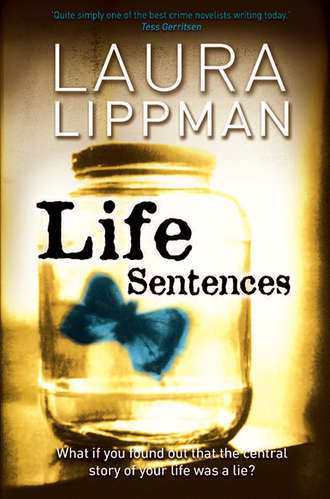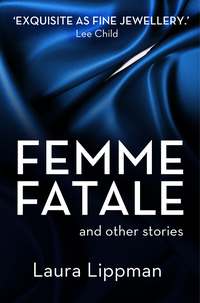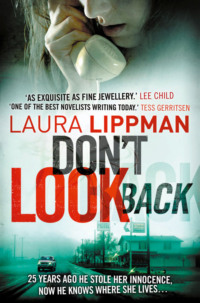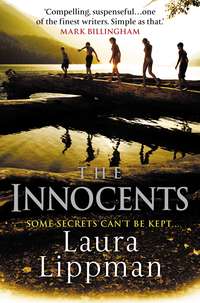
Полная версия
Life Sentences
That was where Cassandra’s memories of Callie started—and stopped. How could that be? For the first time, Cassandra had some empathy for the neighbors of serial killers, the people who provided the banalities about quiet men who kept to themselves. Someone she knew, someone who had probably come to her birthday parties, had grown up to commit a horrible crime, and all Cassandra could remember was that…she was a quiet girl. Who kept to herself.
Fatima had known her well, though, because she had once lived in the same neighborhood. And Cassandra remembered a photograph from the last-day-of-school picnic in fourth grade, the girls lined up with arms slung around one another’s necks, Callie at the edge. That photo had appeared, in fact, along with several others on the frontispiece of her first book, but only as testimony to the obliviousness of youth, Cassandra’s untroubled, happy face captured mere weeks before her father tore their family apart. Had she even mentioned Calliope in passing? Doubtful. Callie simply didn’t matter enough; she was neither goat nor golden girl. Tisha, Fatima, Donna—they had been integral to Cassandra’s first book. Quiet Callie hadn’t rated.
Yet she was the one who grew up to have the most dramatic story. A dead child. Seven years in jail, refusing to speak. Who was that person? How did you go from being Quiet Callie to a modern-day Medea?
Cassandra glanced at the clock. Almost five here, not yet eight in New York, too early to call her agent, much less her editor. She pulled on the hotel robe and went over to the desk, where her computer waited in sleep mode. She started an e-mail. The next book would be true, about her, but about something larger. It would include her trademark memories but also a new story, a counterpoint to the past. She wouldn’t track down just Callie but everyone she could remember from that era—Tisha, Donna, Fatima.
Cassandra was struck, typing, by how relatively normal their names had been, or at least uniform in spelling. Only Tisha’s name stuck out and it was short for Leticia, which might explain why she had been so quick to save Calliope with a nickname. Names today were demographic signifiers and one could infer much from them—age, class, race. Back then, names hadn’t revealed as much. Cassandra threw that idea in there, too, her fingers racing toward the future and the book she would create, even as her mind retreated, hopscotching through the past, to fourth grade, then ninth grade, back to sixth grade—her breath caught at a memory she had banished years ago, one described in the first book. What had Tisha thought about that? Had she even read My Father’s Daughter?
Yet Callie would be the central figure of this next book. She must have done what she was accused of doing. Had it been a crime of impulse? An accident? How had she hidden the body, then managed not to incriminate herself, sitting all those years in jail? Was there even a plausible alternative in which Callie’s son was not dead? Was she protecting someone?
Cassandra glanced back at the television screen, watched Callie come around again. Cassandra understood the media cycle well enough to know that Callie would disappear within a day or two, that she was a place-marker in the current story, the kind of footnote dredged up in the absence of new developments. Callie had been forgotten and would be forgotten again. Her child had been forgotten, left in this permanent limbo—not officially dead, not even officially missing, just unaccounted for, like an item on a manifest. A baby, an African-American boy, had vanished, with no explanation and yet no real urgency. His mother, almost certainly the person responsible, had defeated the authorities with silence.
That’s good, Cassandra told herself. She put that in the memo, too.
First Words
I didn’t speak until I was almost three years old. And then it was only because my mother almost killed me. Almost killed both of us, but she had the luxury of making the decision. I was literally just along for the ride.
My mother didn’t worry about my silence, however. It was my father, a classics professor at Johns Hopkins University, who brooded constantly. The possibility of a nonverbal child—and all the other intellectual limitations that this circumstance implied—terrified my father so much that he would not allow my mother to consult specialists. He knew himself well enough to understand that a diagnosis could change his love for me. My father believed in unconditional love, but only under certain conditions.
Besides, he was not irrational to hope that I might be keeping my own counsel for as yet undisclosed reasons. I had walked early and hit the other developmental milestones more or less on time. And I wasn’t mute. I had a three-word vocabulary: yes, no, and Ric, which is how my father, Cedric, was known. I’m not sure why I had no term for my mother. Perhaps ‘Lenore’ was too subtle for my baby mouth. More likely, I didn’t recognize that my mother was a separate entity but saw her as my larger self, capable of detaching from my side in order to meet my needs. With her, I didn’t even use my three paltry words, instead pointing and grunting to indicate my desires. ‘We should have named her Caliban instead of Cassandra,’ my father said.
My refusal to speak continued until almost a month before my third birthday. It had snowed, an early-spring snowstorm that was uncommonly common in Baltimore. On this particular day—a Thursday, not that my three-year-old mind could distinguish days, but I have checked the family story against newspapers from that week—my mother set out to do the marketing, as she called it then, at the old Eddie’s supermarket on Roland Avenue.
The snow had started before she set out, but the radio forecaster was insisting it would not amount to much. In the brief half hour she shopped, the snow switched to rain, then changed over to sleet, and she came out to a truly treacherous world, with cars spinning out of control up and down Roland Avenue. She decided that the main roads would be safer and calculated a roundabout route back to our apartment. But she had forgotten that Northern Parkway, while wide and accommodating, was roller-coaster steep. The car slithered into its left turn onto the parkway, announcing how dangerous her choice was, but it was too late to turn back. The unsanded road lay before her, shining with ice, a traffic light at its foot. A traffic light at which she would never be able to stop. What to do?
My pragmatic, cautious mother killed the engine, took her foot off the brake and coasted down, turning our car, a turquoise-and-brown station wagon, into a toboggan. I bobbled among the sacks of groceries, unmoored and unperturbed. The car picked up speed, more speed than my mother ever anticipated, yet not enough to get her through the intersection before the light changed to red. She closed her eyes, locked her elbows, and prayed.
When she opened her eyes, we had come to rest in the tiny front yards of the houses that lined Northern Parkway, shearing off a hydrant, which sent a plume of water into the air, the droplets freezing as they came back to earth, hitting our car like so many pebbles. But the last might be a detail that my father added, as he was the one who told this story over and over. Careful Lenore, rigid Lenore, skating down a hill with her only child in the back of the car. My mother could barely stand telling it even once.
That night, at dinner, decades later as far as my mother was concerned—after the police came, after the car was towed, after we were taken to our apartment in a fire truck, along with the groceries, not so much as an egg cracked—my father finished his characteristically long discourse on his day in the groves of academe, which my father inevitably called the groves of academe. Who had said what to whom, his warlike thrusts, as he called his responses, an allusion to Maryland’s state song. His day finally dispatched, he asked, as he always did, ‘Anything to report from the home front?’
To which, I am told, I answered, although not in a recognizable language. I babbled; I circled my pudgy baby arms wildly, trying to simulate the motion of the car. I patted my head, attempting to describe the headwear of the various blue-and yellow-suited men who had come to our rescue. I even did a credible imitation of a siren. Within twenty-four hours, my words came in, like a full set of teeth.
‘And from that day forward,’ my father always says at the end—‘From that day forward’—he is a great one for repeating phrases, for emphasis—‘from that day forward, no one could ever shut you up.’
From My Father’s Daughter by Cassandra Fallows, published in 1998 and now in its nineteenth printing.
Chapter Two
‘Cassandra Fallows? Who’s she with?’
Gloria Bustamante peered at the old-fashioned pink phone memo the temp held out with a quavering hand. The girl had already been dressed down three times today and was now so jangly with nerves that she was caroming off doors and desks, dropping everything she touched, and squeaking reflexively when the phone rang. She wouldn’t last the week, an unusually hectic one to be sure, given all the calls about the Harrington case. Too bad, because she was highly decorative, a type that Gloria favored, although not for the reasons suspected by most.
The girl examined her own handwriting. ‘She’s a writer?’
‘Don’t let your voice scale up at the end of a declarative sentence, dear,’ Gloria said. ‘No one will ever take you seriously. And I assume she’s a writer—or a reporter—if she’s calling about Buddy Harrington. I need to know which newspaper or television program she reps.’
Gloria’s tone was utterly neutral to her ears, but the girl cowered as if she had been threatened. Ah, she had probably hoped for something far more genteel when she signed up at the agency, an assignment at one of those gleaming start-ups along the water. Arriving at Gloria’s building, an old nineteenth-century town house, she would have adjusted her expectations to something old-fashioned but still grand, based on the gleaming front door and restored exterior, the leaded glass and vintage lighting on the first two floors.
Those lower floors, however, were rented to a more fastidious law firm. Gloria’s own office was on the third story, up a sad little carpeted staircase where dust rose with every step and the door gave way to a warren of rooms so filled with boxes that visitors had to take it on faith that there was furniture beneath them. ‘I want prospective clients to know that every one of the not insignificant pennies I charge goes to their defense, not my décor,’ Gloria told the few friends she had in Baltimore’s legal community. She knew that even those friends, such as they were, amended in their heads, It’s not going to your wardrobe or your upkeep, either. For Gloria Bustamante was famously, riotously, deliberately seedy, although not as cheap with herself as she was with her office. The run-down heels she wore were Prada, her stained knit suits came from Saks Jandel in DC, her dirty rings and necklaces had been purchased on lavish trips abroad. Gloria wanted people to know that she had money, that she could afford the very best—and could afford to take crappy care of the very best.
The girl stammered, ‘N-no, she’s not a journalist. She wrote that book, the one about her, um, father? Father. I read it for book club? I mean, I did, I read it for book club.’
‘Pretty young girls go to book clubs? I thought those were for ugly old broads such as me. Not that you’ll catch me in a room full of women, drinking wine and talking about a book. Drinking, maybe.’
The girl’s eyes skittered around the room, trying to find a safe place to land. Clearly, she was unsure if she was obliged to contradict the inescapable truth of Gloria’s appearance or if she should pretend that she hadn’t yet noticed that Gloria was old and ugly.
‘It was a mother-daughter book club,’ she said at last. ‘I went with my mom.’
‘Thanks for the clarification, dearie. Otherwise, I might think you went with your prepubescent daughter, conceived, in the great local tradition, when you were a mere middle schooler.’
The girl took a few steps backward. She had that breathtaking freshness seen only in girls under twenty-five when everything—hair, eyes, lips, even fingernails—gleamed without benefit of cosmetics. The whites of this girl’s eyes were more startling to Gloria than the light-blue irises, the shell-pink ears as notable as the round, peachy cheeks. And she had the kind of boyish figure that was increasingly rare in this era of casual plastic surgery, when even the thinnest girls seemed to sprout ridiculously large breasts. Gloria remembered the tricks of her youth, not that she had ever bothered with them, the padded bras, the wads of Kleenex. They had been far more credible in their way than all these perky cantaloupes, which looked, in fact, as if they had been molded with very large melon ballers. Real breasts weren’t so round. She hoped this girl wouldn’t tamper with what nature had allotted her.
‘I grew up in Ruxton?’ the girl said, and it was clear that she intended the well-to-do suburb to establish that she was not the kind of girl who had a baby at age twelve. Oh, you’d be surprised, dearie, Gloria wanted to say. You’d be shocked at the wealthy families who have sat in my office, trying to decide what to do when one of Daddy’s friends—or Daddy himself—has helped himself to an underage daughter. It happens. Even in Ruxton. After all, Buddy Harrington happened in a suburb not that far from Ruxton.
‘I’m sure you did,’ Gloria said. ‘So Cassandra Fallows wants to write a book about Buddy Harrington? She must be one of those true-crime types who specialize in whipping books out in four to six weeks. We’ll give her a wide berth.’
Buddy Harrington was, as of this third full week in February, being held responsible for 80 percent of the murders in Baltimore County this year. Granted, the county had only five homicides so far, as compared to the city’s thirty or so. Still, Harrington was charged with four of them—his mother, father, and twin sisters, all shot as they slept. The sixteen-year-old had called the police on a Thursday evening two weeks ago, claiming to have discovered the bodies after returning home from a chorale competition in Ocean City. He had been charged before the day was out, although he had yet to confess and was pressing Gloria to let him tell his story far and wide. She was holding him back precisely because of that eagerness, his keenness to perform. For Buddy Harrington was not the kind of boy who inspired the usual descriptions of those who snap—quiet, introverted. He was an outstanding student, a star athlete, and a gifted singer, well liked by classmates, admired by teachers. The community was stunned.
Gloria, who had spent several hours with Buddy since his arrest, was not. She also knew that all the things that Buddy considered his assets—his good looks, his normalcy—would undercut him. Nothing terrified people more than an all-American sociopath. And until—unless—she got Buddy into the juvenile system, she had to keep him from tainting his future jury. Which would not, of course, be a jury of his peers, but a dozen middle-class mothers and fathers who would be undone by his poise, his composure. Especially—shades of O.J.!—if he stuck to this help-me-find-the-real-killer scenario.
‘No, it’s not about Buddy. She wants to ask you about an old case?’ The girl squinted at her own handwriting. ‘Something about a calley-ope?’
‘A calley—do you mean Calliope?’ Gloria could afford to keep her office in disarray and limit her exposure to computers because the entire history of her practice was always available to her. She had a prodigious memory. On those rare occasions when someone felt intimate enough to challenge her on her drinking, she maintained that it was the only way to level the playing field.
Not that she was likely to forget Callie Jenkins under any circumstances. She had tried.
‘Yes, that’s it. Calliope. Calliope Jenks.’
‘Jenkins.’
‘Right.’
‘What, specifically, does she want to know?’
‘She wouldn’t say?’
‘Did you ask?’
The girl’s downward gaze answered the question more emphatically than any statement-question she might have offered in return. Gloria leaned across the desk and tried to take the paper, but the girl was out of reach. She moved forward tentatively, as if Gloria might bite her, jumping back as soon as Gloria had the phone memo in her hand.
‘It’s an out-of-state number,’ Gloria said. ‘New York, I think, but not the city proper. Long Island, maybe Brooklyn. I can’t keep all the new ones straight.’ She had, in fact, once been able to recognize every area code at a glance. She knew state capitals, too, and was always the one person at a party who could complete any set of names—the seven dwarves, the nine Supreme Court justices, the thirteen original colonies.
‘But she’s in town,’ the girl said, thrilled that she had gleaned an actual fact. ‘For a while, she said. That’s her cell. She said she plans to be in town for a while.’
Gloria crumpled the pink sheet and tossed it in the overflowing trash can by the desk, where it bounced out.
‘But she’s famous!’ the girl said. ‘I mean, for a writer. She’s been on Oprah.’
‘I don’t talk to people unless they can help me. That case ended a long time ago, and it’s better forgotten. Callie’s a private citizen now, living her life. It’s the least she deserves.’
Was it? Gloria wondered after dismissing the girl. Did Calliope have the least she deserved or far more? What about Gloria? Had she gotten more than she deserved, less, or exactly her due? Had Gloria done the best she could for Callie, given the circumstances, or let her down?
But Gloria didn’t like the concept of guilt any more than she liked the word guilty coming from a jury foreman, not that she had a lot of experience hearing the latter. Guilt was a waste, misplaced energy. Guilt was a legal finding, a determination made by others. Gloria didn’t have time for guilt, and she was almost certain she didn’t deserve to feel it, not in the case of Callie Jenkins. Almost.
She called the temp agency and told them she wouldn’t be able to use the new girl past this week. ‘Send me someone new. More capable, but equally pretty.’
‘You’re not allowed to say that,’ the agency rep objected.
‘Sue me,’ Gloria said.
Chapter Three
‘Why aren’t you staying with me?’ her mother asked, and not for the first time. ‘That was the original plan.’
‘Yes, when I was going to be in Baltimore a week. But for ten, twelve weeks? I would drive you crazy.’ And you me.
‘But a hotel room, for all that time—you won’t be able to cook for yourself—’
‘It’s an apartment, the kind set up for short-term corporate renters.’ Cassandra anticipated her mother’s next protest: ‘It’s not that expensive.’
‘Did you sublet your place back in New York?’
‘No.’
‘So you’re carrying two rents for three months. And you’ll need a car here.’
‘Mom, I have my own car. I drove down. I drove here, it’s parked in your driveway.’
‘I don’t know what the point is of having a car if you live in New York.’
‘I like to be able to get away—visit friends upstate or at the…beach.’ She used the generic, beach, instead of the specific, Hamptons, out of fear that the latter would provoke another spasm of worry.
The reviews of the last book had been hard on her mother. Her mother’s e-mails had been hard on Cassandra. Until this winter, she hadn’t even known that her mother could initiate e-mail. She seemed to use the laptop that Cassandra had given her for nothing more than playing hearts and solitaire while depending on the reply-to function to answer Cassandra’s sporadic notes. Even then, she was extremely terse. ‘Thank you.’ Or ‘That’s nice, dear.’ Lennie Fallows seemed to think e-mail was the equivalent of a telegram or a long-distance call back in the seventies. It was a mode of communication to be limited to dire emergencies or special occasions, and even then brevity was required.
Then, back in January, the e-mails had started, with no ‘RE:’ in the subject headers, with no subject headers at all, which made them all the more terrifying, as Cassandra had no idea what conversation her mother was about to start.
‘I wouldn’t worry about the Kirkus.’ ‘The PW is good, if you omit the dependent clause.’ ‘Sorry about the New York Times.’
Except she hadn’t written ‘the New York Times’ or even ‘NYT’, come to think of it, but the critic’s surname, as if the woman were a neighbor, an intimate. This detail saddened Cassandra most of all. All she had ever wanted was to give her mother a sense of ownership in Cassandra’s success. She had felt that way even as a teenager, back when Lennie was, in fact, a profound embarrassment, running around town in—oh, God, the memory still grated—painter’s pants or overalls, that horrible cap on her head, tools sticking out of her pockets. Yet Lennie insisted on crediting Cassandra’s achievements to her ex-husband’s side of the DNA ledger. Even the book that had forged Cassandra’s reputation had been problematic for her mother, arriving with that title that slanted everything toward him.
But the life that book brought Cassandra—ah, that her mother had loved and gloried in, and not because of the small material benefits that came her way. She adored turning on the radio and hearing Cassandra’s voice, basked in being in a store and having a neighbor comment on one of Cassandra’s television appearances. Once, in the Giant, Cassandra had seen how it worked: Her mother furrowed her brow at the mention of Cassandra’s most recent interview, as if it were impossible to keep track of her daughter’s media profile. Was it Today? Charlie Rose? That weird show on cable where everyone shouted?
You must be very proud of her, the neighbor persisted.
And Lennie Fallows—it had never occurred to her to drop the surname of the man she detested—said with steely joy, ‘I was always proud of her.’ In her mother’s coded lexicon, this was the rough equivalent of Go fuck yourself.
Cassandra opened the refrigerator to browse its contents, a daughter’s prerogative. It was huge, the kind of double-wide Sub-Zero one might find in a small restaurant. The kitchen had been Lennie’s latest project, and superficially, it looked great. But Cassandra knew where to find the corners her mother never stopped cutting, a legacy of the lean years that had left her so fearful. The refrigerator and the stove would be scratch-and-dent specials, with tiny flaws that prevented them from being sold at full list. The new porcelain sink would have been purchased at Lennie’s ‘professional’ discount—and, most likely, installed by her, along with the faucet and garbage disposal. She had kept the palette relatively plain. ‘Better for resale,’ she said, as if she had any intention of putting the house on the market. Like Penelope stalling her suitors, Lennie continually undid her own work. By Cassandra’s reckoning, this was the kitchen’s third renovation. Lennie was desperate not to leave the house, which had been big for a family of three, almost ruinous for a single mother and daughter, simply ridiculous for a woman now in her seventies.
But this conversation was already too fraught to take on the subject of the house, which her mother had come to love and defend against all comers. Instead, Cassandra asked her mother, ‘Do you remember Calliope?’
‘An organ? You mean at the Presbyterian church? And I think it’s pronounced differently, dear.’ Her father would have made the correction first.





